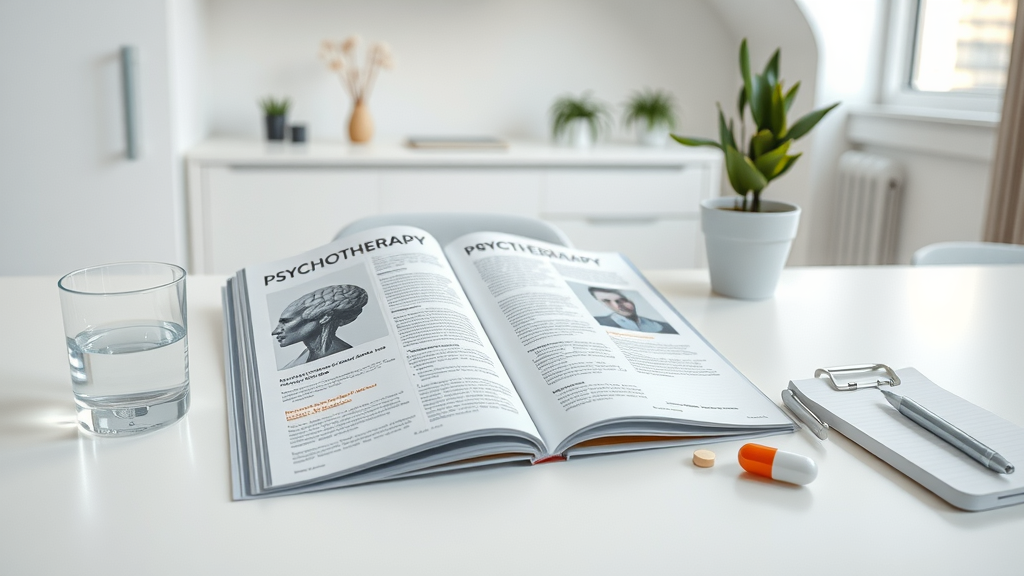Did you know that up to 21 million adults in the United States experience major depression each year, yet only a handful of studies have rigorously explored hypnosis as a support strategy for this pervasive condition? While antidepressants and talk therapies dominate most treatment plans, the concept of hypnosis for depression support is quietly challenging traditional thinking. Recent systematic reviews and clinical trials are beginning to illuminate what this surprising therapy might offer—and what science still needs to discover. If you’re searching for hope beyond standard options, or simply want a fresh look at treating depression, this guide will walk you through the research, expert opinions, and practical considerations you need to know.
A Startling Look at Hypnosis for Depression Support: What Research Says
“Despite skepticism, some studies report significant improvements in depression symptoms with hypnosis.”

There’s rising curiosity and cautious optimism about hypnosis for depression support: what research says. The mental health community has long wondered whether hypnosis—a tool historically seen as fringe—can deliver statistically significant and lasting improvements in treating depression. Early clinical trials and systematic reviews have uncovered both promising effect sizes and important limitations. For patients looking for alternatives or adjuncts to conventional treatments like cognitive behavioral therapy or medication, clinical hypnosis stands as a potential new pathway. But is the evidence robust enough to recommend it widely? This article cuts through the confusion to offer a clear, evidence-based perspective on hypnosis for depression support, weighing the supportive clinical and experimental findings against ongoing controversy and gaps in knowledge.
What You'll Learn About Hypnosis for Depression Support: What Research Says
The current evidence on hypnosis and depression
How clinical hypnosis compares with traditional therapies
Key insights from systematic reviews and clinical trials
What the psychological community really thinks
Risks, side effects, and safety considerations
Tips for finding qualified hypnosis support
Understanding Depression: Context for Hypnosis for Depression Support
Defining Depression in Clinical Practice and Mental Health

Depression is more than a fleeting sense of sadness. In clinical practice and mental health settings, it’s defined as a persistent and pervasive mood disorder that severely impacts daily life. Key symptoms include a loss of interest or pleasure, changes in sleep and appetite, guilt, and difficulties with concentration. For millions in the United States and around the world, treating depression is a multifaceted journey that includes assessment for related conditions, such as anxiety or physical illnesses, before crafting tailored interventions. While medication and psychotherapy, especially cognitive behavioral therapy (CBT), have shown effectiveness, experimental hypnosis and alternative treatments increasingly receive attention in systematic reviews. This expanding scope recognizes that for some, traditional routes may not achieve desired outcomes, prompting the exploration of safe, adjunctive support methods like clinical hypnosis.
Current Options in Treating Depression: Medication, Therapy, and Beyond

The modern landscape for treating depression extends beyond prescription medications and talk therapy. Cognitive behavioral therapy remains a gold standard, supported by robust clinical trial evidence and systematic reviews for its effect size in alleviating depressive symptoms. Antidepressant drugs, including SSRIs and SNRIs, are commonly prescribed—often in tandem with counseling. Newer alternatives such as digital therapy platforms, mindfulness training, and even lifestyle interventions like structured exercise programs, are now routinely integrated into care. Yet, despite these advances, many patients seek further relief or experience only partial improvement, which leads to growing interest in adjunctive therapies like clinical hypnosis. Controlled trials and meta-analyses now explore how tools like hypnotic suggestion, focused attention, and experimental hypnosis might fill gaps in traditional treatment plans, especially for those facing chronic or recurrent depressive episodes.
What is Hypnosis for Depression Support? What Research Says
Overview of Clinical Hypnosis Explained
Clinical hypnosis is a therapeutic technique where a clinician guides a patient into a state of deep relaxation and focused attention. During hypnosis, individuals often experience heightened receptivity to therapeutic suggestions tailored toward improving mood, reframing negative thoughts, or altering harmful patterns of thinking. While experimental hypnosis has been used in pain management and irritable bowel syndrome, it’s now being seriously scrutinized for its impact on mental health, particularly depression. Hypnotic suggestions are carefully customized to support the individual, such as reducing rumination or boosting self-esteem. Unlike entertainment hypnosis, clinical practice is grounded in ethical frameworks, informed consent, and professional qualifications—often requiring additional certification beyond standard mental health training. This distinction is crucial when interpreting what hypnosis for depression support what research says in peer-reviewed literature and systematic reviews.
How Hypnosis Session Works for Mental Health
A typical hypnosis session for depression support begins with the therapist establishing rapport and assessing the client’s needs. The practitioner guides the individual into a relaxed, trance-like state through soothing verbal cues and visualization. Once this focused attention is achieved, the therapist delivers targeted hypnotic suggestions aimed at relieving depressive symptoms, such as encouraging positive self-talk or building coping resources. Recent clinical trials and systematic reviews have explored whether these sessions yield statistically significant improvements compared to a control group receiving standard care or other therapies. Importantly, not everyone responds equally to hypnotic suggestion—outcomes can hinge on practitioner skill, patient motivation, and coexisting mental health concerns. Each session typically closes with patients being returned to a normal state of consciousness, followed by debrief and integration. Combined with conventional treatment, hypnosis may offer an effective treatment pathway for select individuals battling depression.

Systematic Review Findings: Hypnosis for Depression Support What Research Says
Key Takeaways from Systematic Reviews and Meta-Analyses
Systematic reviews serve as a gold standard for synthesizing evidence across clinical and experimental hypnosis studies. Multiple meta-analyses have evaluated hypnosis for depression support what research says, examining effect size, rates of remission, and side effect profiles versus conventional therapies. Most reviews conclude that hypnosis can provide modest, but statistically significant, benefits in treating depression for certain individuals, particularly as an adjunct to cognitive behavioral therapy or medication. However, these findings are tempered by limitations: many studies included feature small sample sizes, variable methodologies, or short follow-ups, which makes it difficult to draw generalizable conclusions. Still, the overall safety profile appears favorable, with few reported adverse side effects. Experts note that hypnosis seems most effective in motivated participants and in hands of trained professionals. As interest grows, future systematic reviews will likely play a pivotal role in clarifying both the strengths and boundaries of this promising adjunct.
Summary of Systematic Reviews Addressing Hypnosis for Depression Support |
||||
Review Year |
Number of Studies Included |
Main Findings |
Effect Size |
Safety Concerns |
|---|---|---|---|---|
2020 |
9 (RCT/controlled) |
Significant symptom improvement as adjunct to therapy |
Small to Moderate |
Minimal side effect risk |
2018 |
7 (Randomized Controlled Trials) |
Mixed results; most benefit seen in motivated clients |
Variable |
No major adverse events |
2016 |
5 (Clinical and experimental hypnosis trials) |
Adjunct use with CBT outperformed control group |
Moderate |
Generally favorable |

Examining Clinical Trials: Hypnosis for Depression Support What Research Says
Randomized Controlled Trials and Controlled Trials in Treating Depression
The most rigorous form of research, randomized controlled trials (RCTs), are steadily informing the debate about hypnosis for depression support what research says. Recent RCTs and controlled trials typically assign participants to either receive standard care, cognitive behavioral therapy, or hypnosis—sometimes in combination. These studies measure outcomes like depressive symptom scales, remission rates, and side effect incidence. Most report that hypnosis, especially when added to recognized treatments, can produce a statistically significant improvement compared to a control group. For example, one RCT observed greater reductions in symptoms and improved overall mental health for participants receiving both CBT and hypnosis versus CBT alone, with effect sizes ranging from small to moderate. Yet, limitations such as small sample sizes and short study durations remain prevalent, underscoring the need for further, larger-scale investigations into the role of clinical hypnosis in treating depression.
Important Clinical Trial Outcomes Supporting or Challenging Hypnosis
Findings from recent clinical trials present a nuanced picture of hypnosis for depression support what research says. Several controlled trials have demonstrated measurable symptom reduction, increased motivation, and enhanced treatment engagement among those receiving hypnosis as part of their care plan. Conversely, some studies have found no significant difference between the hypnosis and control groups, raising questions about generalizability and placebo effects. Factors influencing outcome include the therapist’s expertise, the patient’s susceptibility to hypnotic suggestions, and whether hypnosis is integrated with evidence-based therapies or used as a standalone intervention. Meta-analyses highlight the importance of tailoring interventions and maintaining a strong therapeutic alliance. While early data is promising, experts stress the need for more robust, adequately powered randomized controlled trials before hypnosis is widely recommended.
“More robust randomized controlled trials are needed to confirm early promising results.” – Leading mental health researcher
How Effective is Hypnosis for Depression Support? Evaluating the Evidence
Comparing Hypnosis with Other Depression Treatments

When stacked against leading depression interventions—like cognitive behavioral therapy, behavioral therapy, and antidepressants—hypnosis is best understood as an adjunct rather than a replacement. Controlled trials and systematic reviews suggest clinical hypnosis can accelerate symptom relief or deepen the therapeutic effect when combined with other modalities. Effect sizes for hypnosis compare favorably to some complementary treatments but are generally modest compared to primary interventions like medication or CBT. Importantly, psychological side effects are rare relative to pharmacotherapy. The most substantial benefits are seen in individuals who are suggestible, actively engaged, and open to mental health innovation. While anecdotal accounts sometimes cite high “success rates,” scientific literature urges caution, highlighting the need for more data that directly compares hypnosis with other gold-standard treatments.
Results from Recent Systematic Reviews and Controlled Trials
Recent systematic reviews examining hypnosis for depression support what research says indicate that hypnosis can, for a subset of patients, lead to statistically significant improvements in mood, functioning, and resilience. Controlled trials often note fewer side effects and improved treatment retention versus alternatives. However, effect sizes vary widely—suggesting that hypnosis is not universally effective. These studies included diverse populations and clinical practice settings, which strengthens external validity but also introduces heterogeneity in findings. Randomized controlled trials remain the benchmark for establishing efficacy, and most agree that while hypnosis shows genuine adjunctive potential, more rigorous research is necessary. The overall safety profile is favorable, and most negative outcomes are minor or transient. In summary, evidence points to hypnosis as a supportive tool for depression—best used in personalized, multidisciplinary care plans.
View: Interview with a clinical hypnosis practitioner on depression support outcomes.
Potential Side Effects and Safety in Hypnosis for Depression Support
Identifying and Managing Side Effect Risks

One crucial area in hypnosis for depression support what research says is the safety and management of potential side effects. Fortunately, systematic reviews and clinical trials generally report minimal risks. Rarely, patients may experience short-term side effects such as disorientation, anxiety, or distress if underlying trauma surfaces during hypnotic suggestion. Proper screening prior to a hypnosis session is essential—especially in individuals with complex mental health or dissociative conditions. The therapeutic setting and the expertise of the practitioner significantly influence safety. It is also vital to use hypnosis as part of a broader treatment plan, not as a replacement for evidence-based care. If side effects do occur, they are usually managed swiftly by returning the individual to a full waking state and providing support. The literature suggests that confidentiality, informed consent, and transparency about hypnosis protocols are best practices for minimizing risk in clinical practice.
Best Practices for Safe Hypnosis Session in Clinical Practice

To maximize the benefits and minimize the risks associated with clinical hypnosis for depression support, adherence to best practices is non-negotiable. Professionals are advised to conduct thorough patient assessments—including mental health history, current medications, and therapy context—before initiating any session. Well-trained therapists should follow established clinical protocols, maintain open communication, and consistently monitor for potential side effects. Sessions should take place in a safe, quiet, and supportive environment, fostering a sense of trust. Clinicians must be transparent about what hypnosis involves, how hypnotic suggestions will be used, and the expected outcome. For patients, seeking licensed, experienced practitioners is key. When integrated responsibly as part of a multidisciplinary treatment plan, hypnosis presents as a safe adjunct therapy with a generally favorable risk profile.
Mental Health Community Perspectives on Hypnosis for Depression Support
What Psychologists Say About Hypnosis and Depression

The psychological community holds mixed views about hypnosis for depression support what research says. Many clinicians recognize hypnosis as a valuable, evidence-informed adjunct—particularly for clients unresponsive to standard interventions or interested in mind-body techniques. Some mental health professionals emphasize the growing number of randomized controlled trials and positive anecdotal accounts. Others remain cautious, citing the limited number of large-scale, high-quality studies and concerns about overhyping effect size or success rates. Mainstream psychology largely agrees that while hypnosis can be effective for select cases, it should never replace established evidence-based therapies, but rather complement them. In other words, hypnosis is not a miracle cure, but may serve as a helpful addition for motivated, properly screened patients in clinical practice.
Clinical Practice Guidelines and Position Statements
Official guidance from leading mental health organizations reflects this cautious optimism. While some clinical practice guidelines acknowledge hypnosis as a legitimate complementary therapy, none recommend it as a first-line treatment for depression. Instead, current position statements emphasize further research—especially large, well-designed randomized controlled trials—and a focus on integrated, patient-centered care. Professional associations stress the importance of proper training and adherence to ethical standards. Most advise that hypnosis for depression support be pursued only through certified practitioners with experience in both clinical hypnosis and mood disorders. As research evolves, it’s likely that guidelines will adapt to reflect new systematic reviews and real-world outcomes from ongoing clinical trials.
Lists: Pros and Cons of Hypnosis for Depression Support
Potential advantages: Useful adjunct to therapy, generally low side effects, can aid treatment-resistant cases, non-invasive, boosts engagement for some patients.
Possible limitations: Insufficient large-scale or long-term evidence, highly dependent on practitioner expertise, limited accessibility in certain regions, variable effect size.
Most appropriate when: Used alongside standard therapy, in motivated patients, as part of a comprehensive mental health plan, supervised by a licensed hypnotherapist.
Frequently Asked Questions: Hypnosis for Depression Support What Research Says
Does hypnotherapy help with depression?
Evidence from systematic reviews and recent clinical trials suggests that hypnotherapy can potentially help alleviate depression symptoms, especially when used as an adjunct to established therapies like cognitive behavioral therapy. While the effect size is generally modest, motivated clients may experience substantial benefit, and side effect risk is low. However, it is not universally effective and more research—including adequately powered randomized controlled trials—is needed to confirm its role in mainstream depression care.
What do psychologists think of hypnotherapy?
Psychologists’ opinions are mixed, with some embracing hypnotherapy as a complementary treatment for depression and others remaining skeptical due to limited high-quality evidence. Generally, the mental health community supports it as an adjunct rather than a primary intervention. Many experts stress the necessity of using hypnotherapy with evidence-based approaches, proper screening, and by qualified professionals, ensuring patient safety and realistic expectations.
Is hypnotherapy a 93% success rate?
Although some sources on the internet claim unusually high success rates for hypnotherapy, such as 93%, scientific consensus does not support these figures for treating depression. Real-world outcomes in clinical practice are far more variable, depending on individual patient characteristics, the skill of the hypnotherapist, and integration with other mental health treatments. The best available evidence from clinical trials and systematic reviews points to moderate but not universal efficacy.
What is the best support for depression?
The gold standard for depression support continues to be evidence-based psychotherapy (such as cognitive behavioral therapy or behavioral therapy), medication where appropriate, and lifestyle modifications like regular exercise and social engagement. For some, adjunctive therapies like hypnosis may offer meaningful additional support, but always as part of a comprehensive, individualized mental health plan overseen by qualified professionals.
Addressing People Also Ask about Hypnosis for Depression Support
Does hypnotherapy help with depression?
Answer: Evidence from some systematic reviews and clinical trials suggests potential, but the overall strength of evidence is moderate and more research is needed.
What do psychologists think of hypnotherapy?
Answer: Opinions are mixed, with some recognized benefits as a complementary therapy, yet mainstream psychology often cites limited robust evidence for widespread use.
Is hypnotherapy a 93% success rate?
Answer: While some sources cite high success rates, scientific consensus does not support a 93% claim—success depends on individual context and comorbidities.
What is the best support for depression?
Answer: Best practice includes evidence-based psychotherapy, medication, lifestyle interventions, and sometimes adjunctive therapies like hypnosis as part of comprehensive care.
Key Takeaways on Hypnosis for Depression Support What Research Says
Hypnosis shows promise as an adjunct therapy for depression support, but evidence remains evolving.
Systematic reviews and clinical trials indicate benefits for some, but not all patients.
Safety profile is generally favorable, though professional oversight is essential.
Consulting with trained clinical hypnosis professionals is advised for those considering this option.
Final Thoughts: Hypnosis for Depression Support What Research Says
“Hypnosis for depression support may not be for everyone, but for some, it can offer a hopeful, evidence-informed adjunct to conventional treatments.”
If you or a loved one are considering hypnosis as part of your depression support strategy, consult a licensed mental health professional to explore whether this adjunctive approach may be right for you.
 Add Row
Add Row  Add
Add 




Write A Comment